22 Minutes
Vilnius’ vibrant startup ecosystem gathered once again for Startup Meetup Vilnius 2025, a dynamic community event where founders, innovators, and investors came together to exchange insights, share experiences, and spark new collaborations.
Hosted at Vilnius Tech Park on September 30, 2025, the meetup featured keynote conversations, live pitches, and open networking — all focused on the real-world lessons behind building and scaling startups.
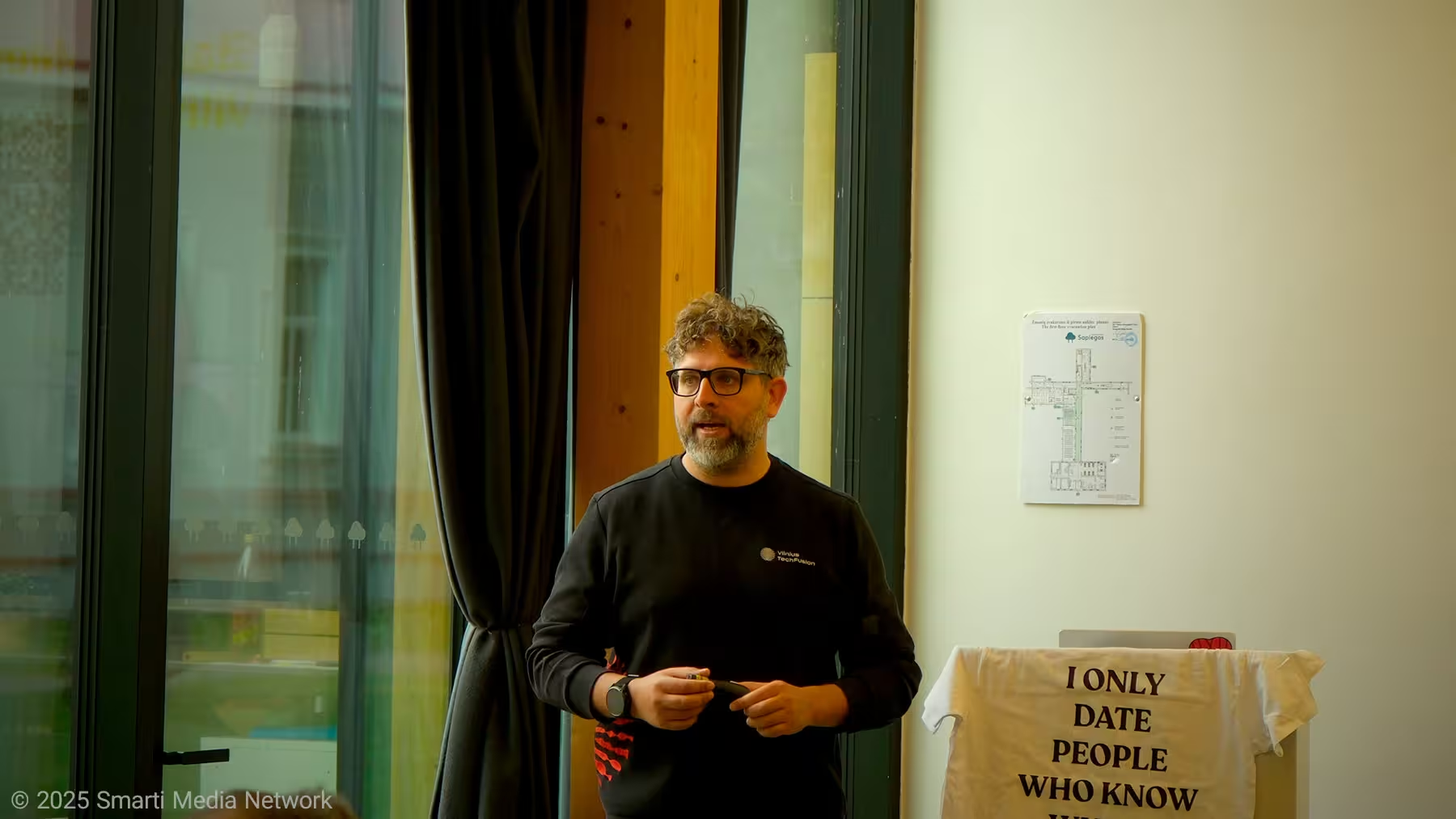
The evening kicked off with a warm introduction by Mangirdas Sapranauskas, who set the tone for a relaxed yet insightful gathering. Soon after, the spotlight turned to a lively fireside chat featuring two leading voices in Lithuania’s startup scene:
Andrius Bičeika – NED at Revolut and Aukok.lt
Audrius Milukas – Co-founder at smeBank and Partner at Superhero Capital
What followed was a refreshingly candid and often humorous conversation, where Andrius shared the untold stories behind Revolut’s rise, the culture that shaped it, and his unfiltered thoughts on what truly drives success.
Fireside Chat: Honest Lessons from the Revolut Journey
Right from the start, Andrius Bičeika made it clear that this wasn’t going to be a polished corporate talk about “hard work” or “hustle.” Instead, he promised an honest conversation about the messy, unpredictable, and often lucky nature of success in startups.
“People love talking about hard work and strategy,” he joked, “but let’s be honest — luck plays a massive role. Timing, place, and a bit of randomness often matter more than anything else.”
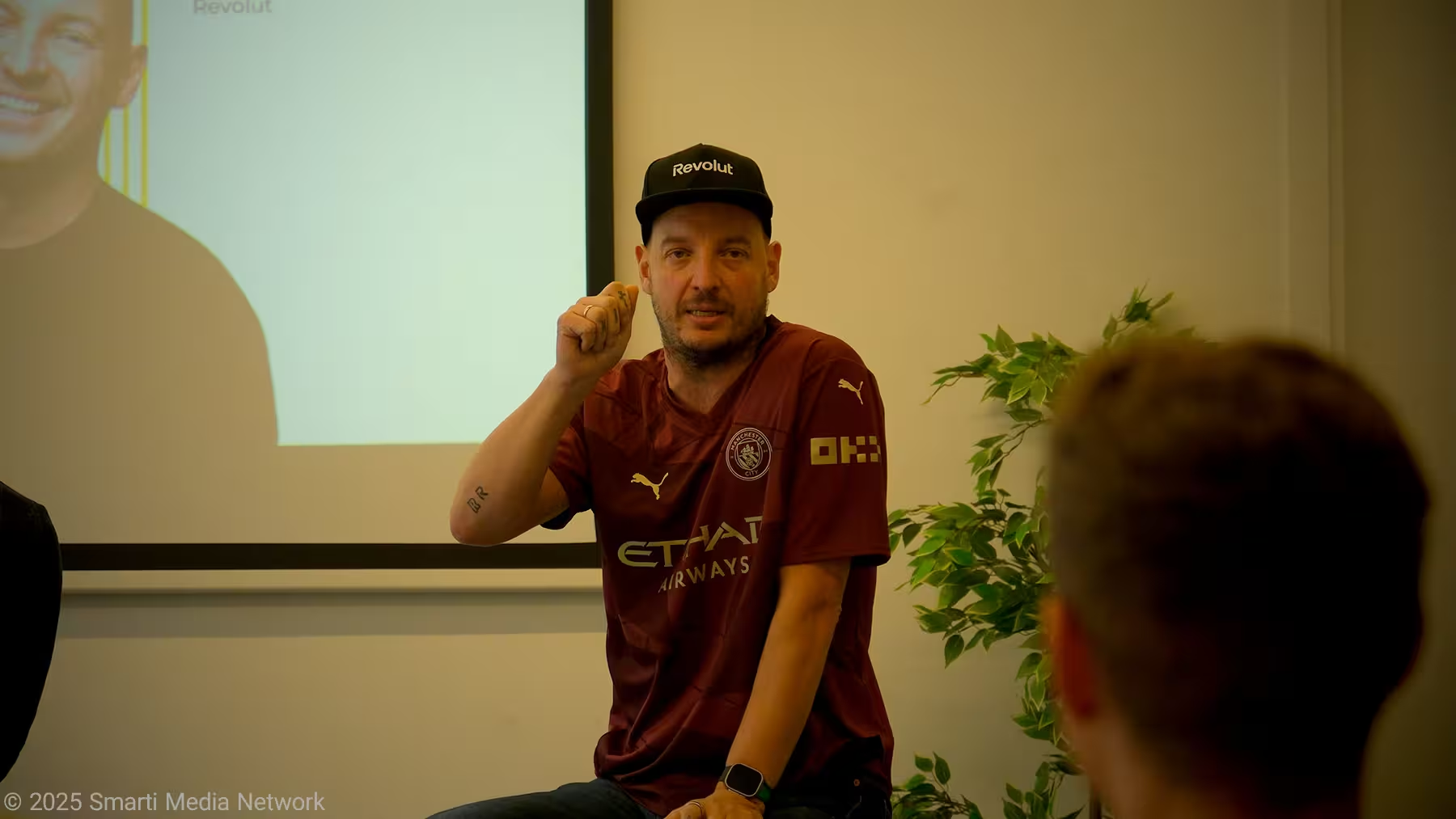
Referring to NYU professor Scott Galloway, Bičeika highlighted how even the most talented founders are often propelled by chance.
“You can work your heart out,” he said, “but if you’re not in the right place at the right time, it may not matter. I’ve been lucky — in my career, and even in meeting my wife!”
He shared that joining Revolut in its earliest days — when the company was still a small, scrappy team — was one of those pivotal moments of luck that changed everything.
From Late-Night Offices to Canary Wharf Towers
Andrius recalled the early Revolut days when only about a dozen people were on the team.
“Back then, I was the last one to turn off the lights in the London office,” he laughed. “Now we’ve just opened a stunning new headquarters right next to JP Morgan — a full-circle moment that says a lot about how far we’ve come.”
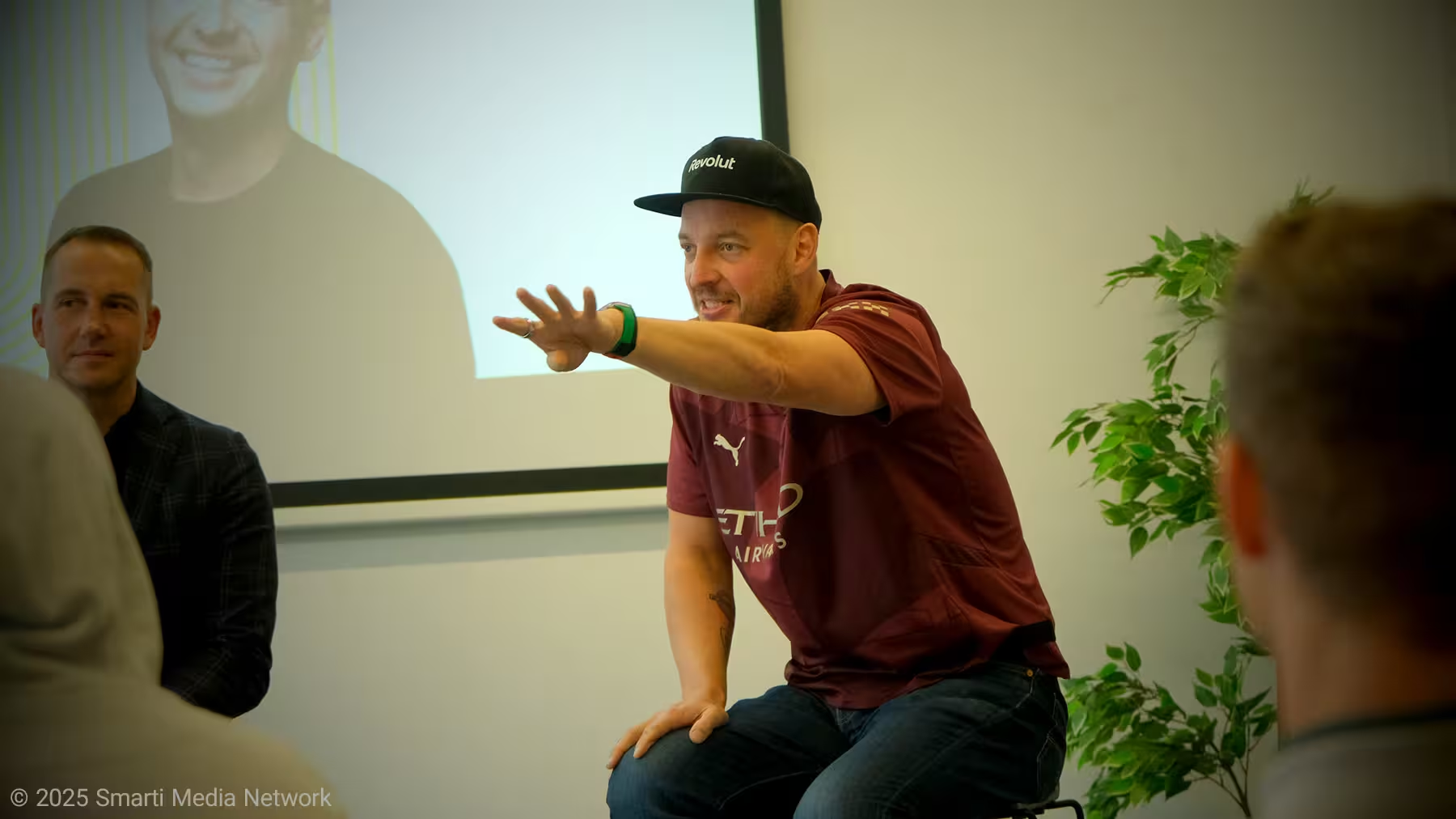
What was once a modest startup now stands among global financial giants, proving that belief, persistence, and timing can transform an idea into an institution.
Culture Starts at the Top
Shifting from anecdotes to principles, Bičeika stressed that culture is built from the top down:
“Culture doesn’t grow from the bottom — it starts with the founders. If they’re lazy or set low standards, the whole team will follow. But if they push hard and set the bar high, that becomes the company’s DNA.”
He described Revolut’s early environment as tough, fast-paced, and demanding — but also incredibly rewarding for those eager to learn and grow:
“Revolut was the worst place on earth for people who hide and avoid responsibility — and the best place for those who wanted to overachieve and stretch themselves every single day.”
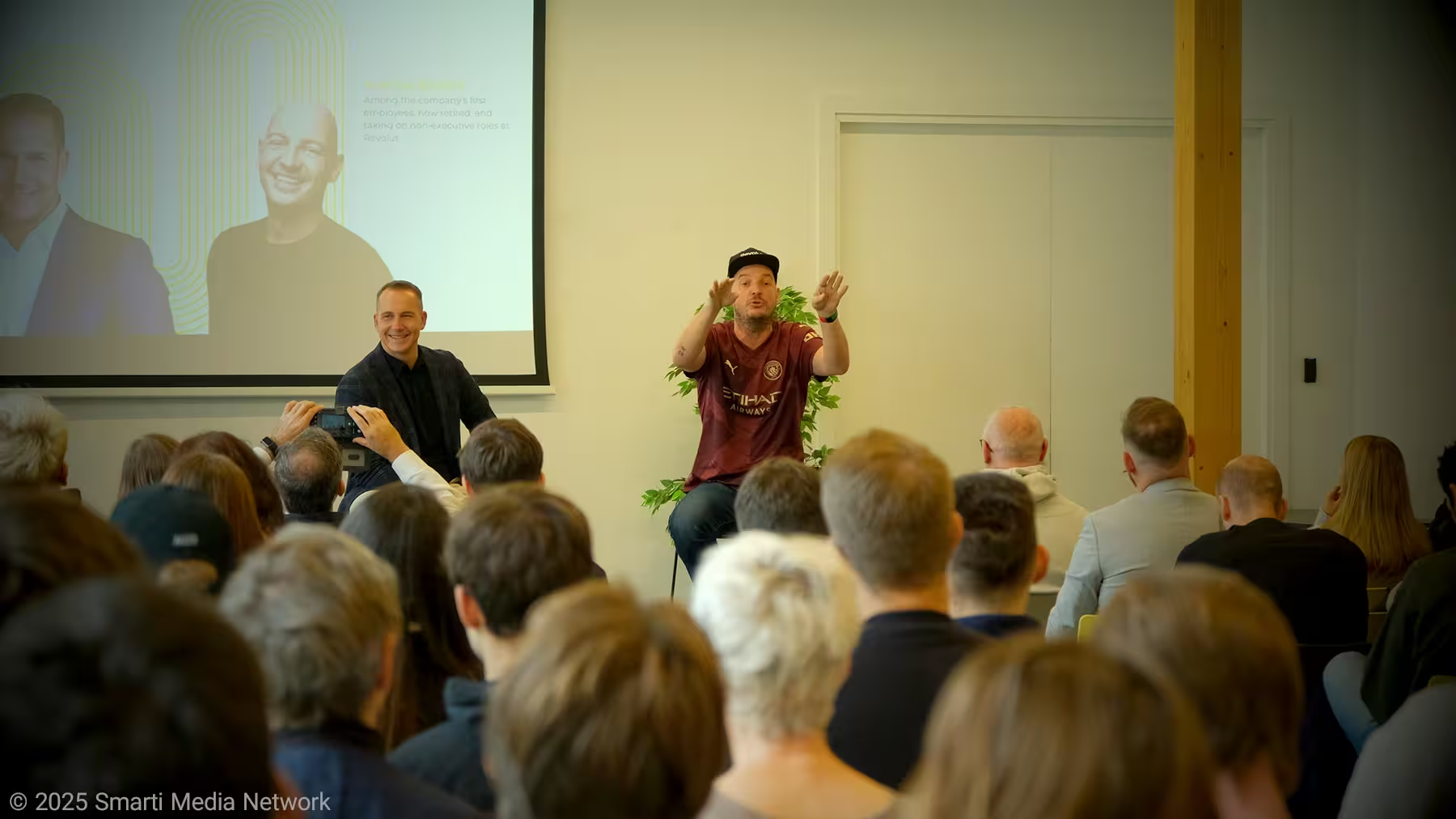
He emphasized that in the early stages, every additional hour of effort compounds exponentially:
“When you’re just starting out, every extra hour you put in is worth triple. The learning curve is so steep — you’d be crazy not to use it.”
Execution Over Ideas
One of his strongest messages was simple but powerful:
“Ideas are cheap. Execution is everything.”
To illustrate the point, Andrius shared the story of launching Revolut Business.
In a bold move, the leadership decided to launch the new product in just two weeks, even though the team wasn’t ready.
“We were only four people. We worked day and night, and somehow launched it on time — full of bugs, sure, but live!”
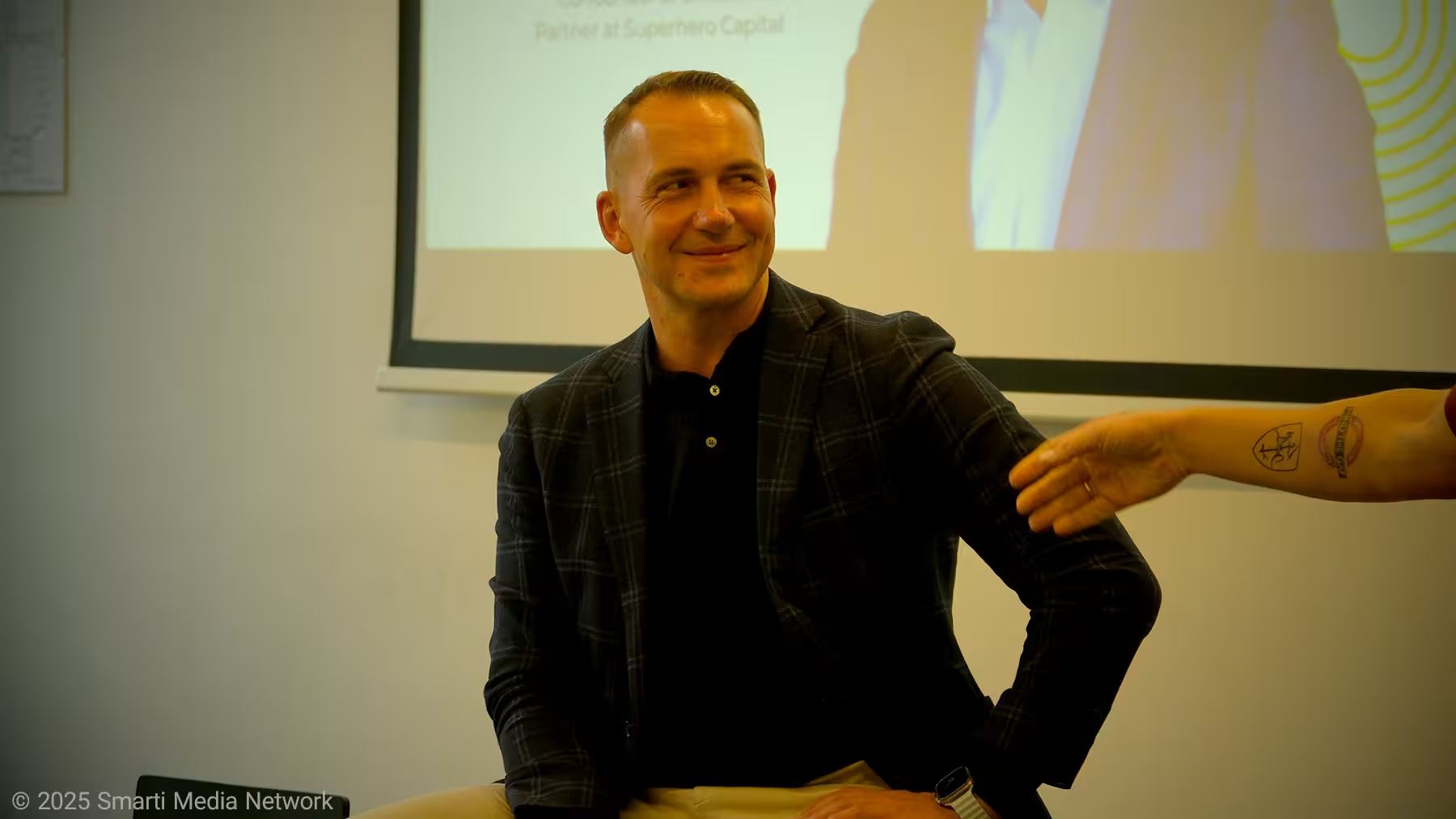
That experience taught him a crucial lesson: don’t wait for perfection.
“Mark Zuckerberg once said: If you’re not embarrassed by what you launch, you launched too late. And he’s right. Shipping fast, failing fast, and learning fast — that’s the only way to grow.”
For Bičeika, the goal of execution is learning through real data, not hypothetical planning:
“You don’t build just to build — you build to collect feedback. Action beats endless discussion.”
Believe in the Product You Build
Another recurring theme was authenticity — working on something you personally believe in and use:
“If you’re not a user of your own product, you’re in the wrong place. During interviews, I always ask candidates: do you use our product? How would you make money with it? If they can’t answer, it’s a red flag.”
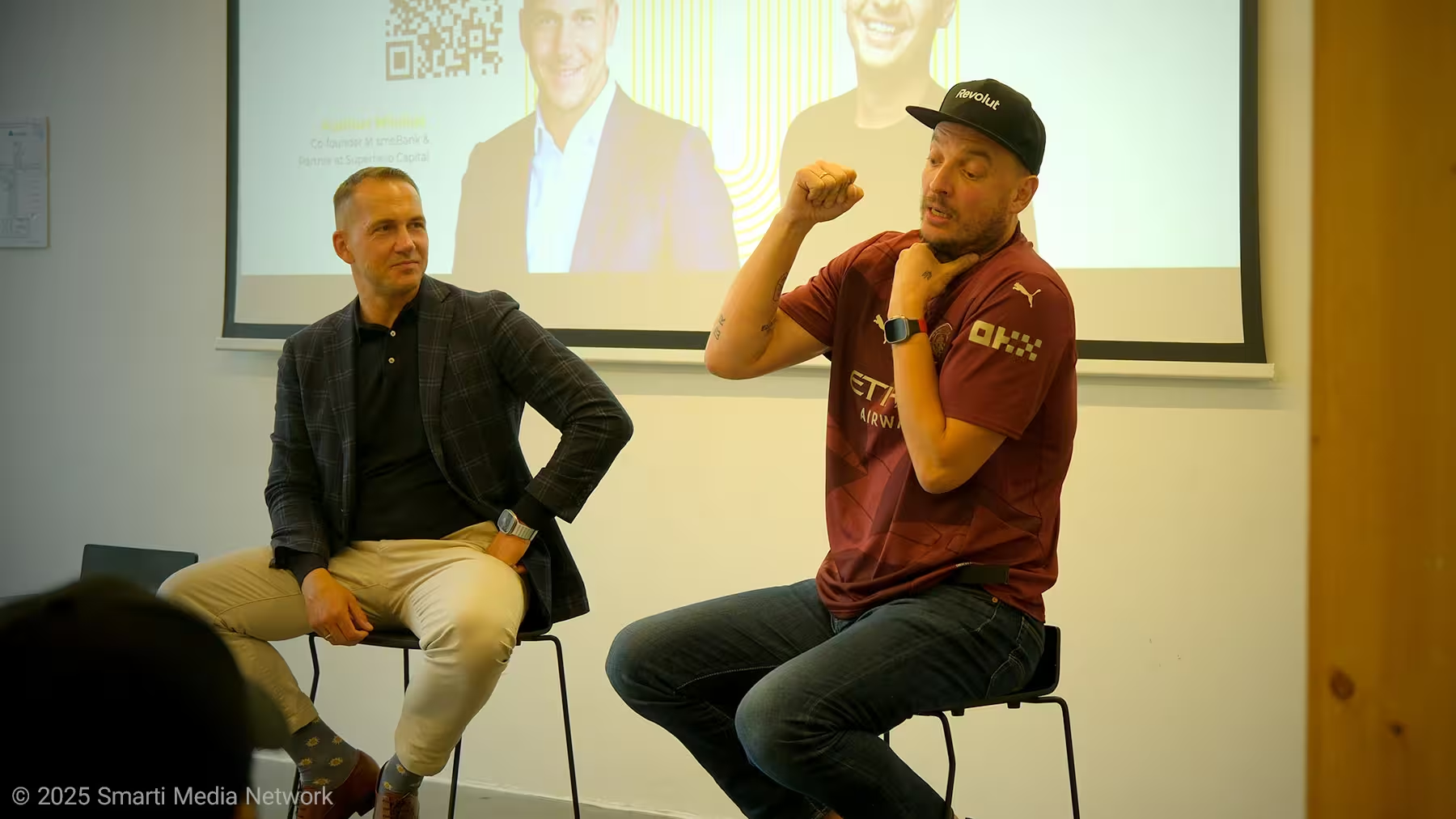
Failures That Teach
Andrius didn’t shy away from talking about failure either. Before joining Revolut, he had tried several startups that didn’t work out:
“We once thought we were sitting on a million-dollar idea — turns out we couldn’t even raise a cent! But those failures were necessary. They taught me what not to do.”
Those lessons, he said, paved the way for success when the right opportunity finally arrived.
Final Takeaway: “Just Do It!”
Bičeika wrapped up his talk with an energizing message:
“Success is built on three pillars: a product you believe in, a culture that drives you, and the courage to act — even before you’re ready. Just do it. Learn as you go. That’s how real growth happens.”
Announcement by Karolina Urbonaitė — Head of Startup Lithuania
After the lively fireside chat with Andrius Bičeika, the stage welcomed Karolina Urbonaitė, Head of Startup Lithuania, who shared a few updates about the country’s biggest upcoming startup event.
She began with a friendly question to the audience:
“How many times have we had these meetups before? Almost every month, right? But only once a year, we all gather for our main event — the Startup Fair.”
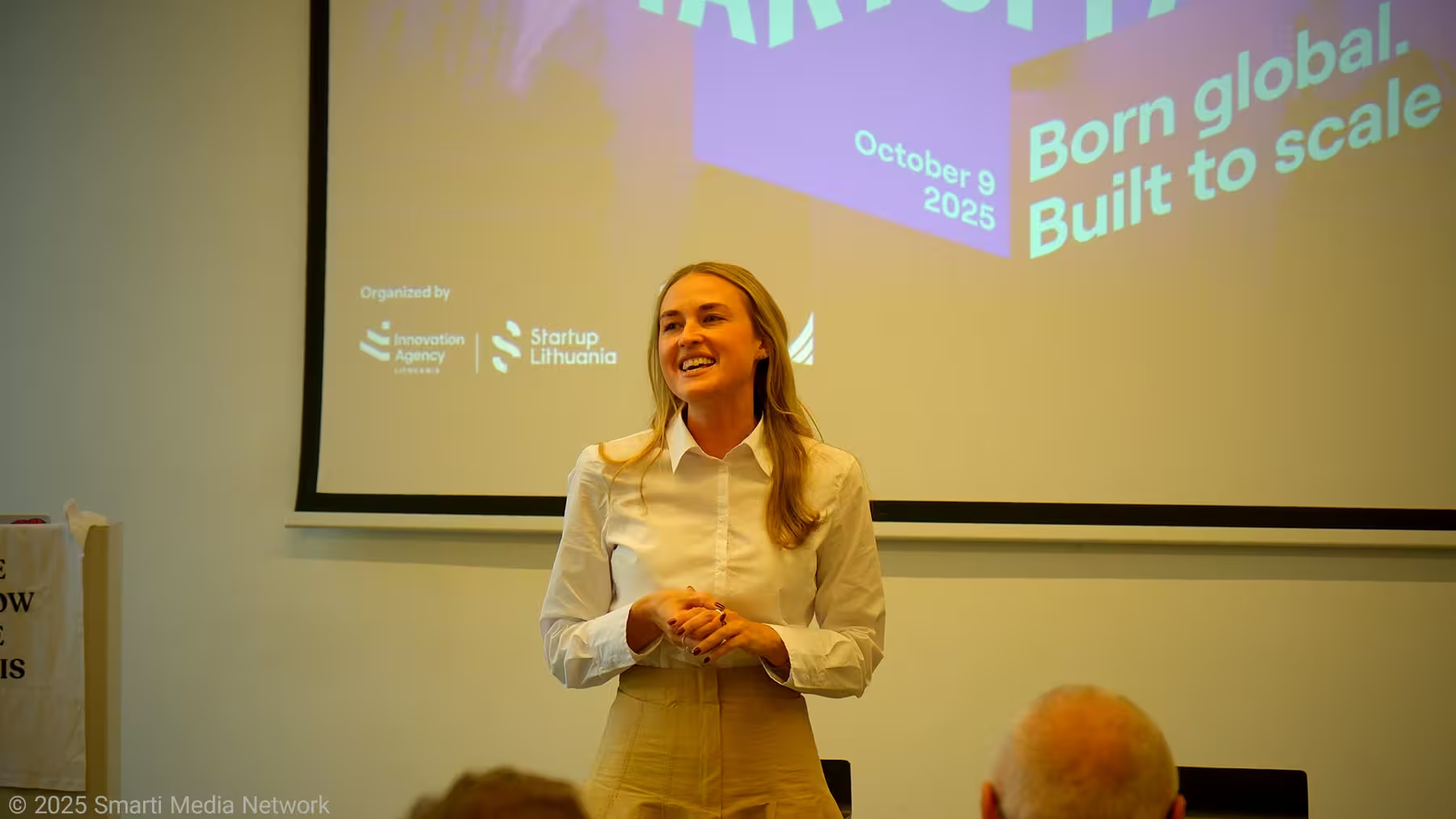
Karolina reminded the community that this year marks the 13th edition of Startup Fair, an annual event that has been running since 2012 and has become one of Lithuania’s most important gatherings for the startup ecosystem.
“If you don’t have your tickets yet, now’s the time!” she said with a smile. “The event is happening next Thursday, October 9, and it’s going to be bigger than ever.”
According to Karolina, the 2025 edition will feature three main stages — two dedicated to keynotes, fireside chats, and panels, and a third hosting a pitch battle where 40 startups will compete for visibility and prizes.
She also added a special note for the evening’s presenters:
“Tonight, we’ll have five spotlight pitches, and the startup that wins the public vote will receive two complimentary tickets to Startup Fair 2025. So don’t forget to vote for your favorite!”
With that, she wished good luck to the participants and encouraged everyone to join next week’s flagship event to celebrate Lithuania’s thriving startup community.
Open Mic & Spotlight Pitches
After Karolina’s short announcement, the evening shifted into one of its most dynamic segments — the Spotlight Pitch Session.
Five early-stage startups were invited to present their ideas on stage, each given three minutes to pitch and two minutes for questions from the audience.
The goal was to showcase innovative solutions, test their messages in front of a live crowd, and compete for the audience’s vote — with the winning team receiving two tickets to Startup Fair 2025.
The first team to take the stage was MY.CHEF, an innovative platform reimagining the way we think about home dining.
MY.CHEF — Bringing Verified Chefs to Your Home Kitchen
The founder of MY.CHEF began his pitch with a relatable question:
“What will my kids eat tomorrow?”
A question many busy families can identify with — juggling work, schedules, and the daily challenge of preparing healthy, high-quality meals.
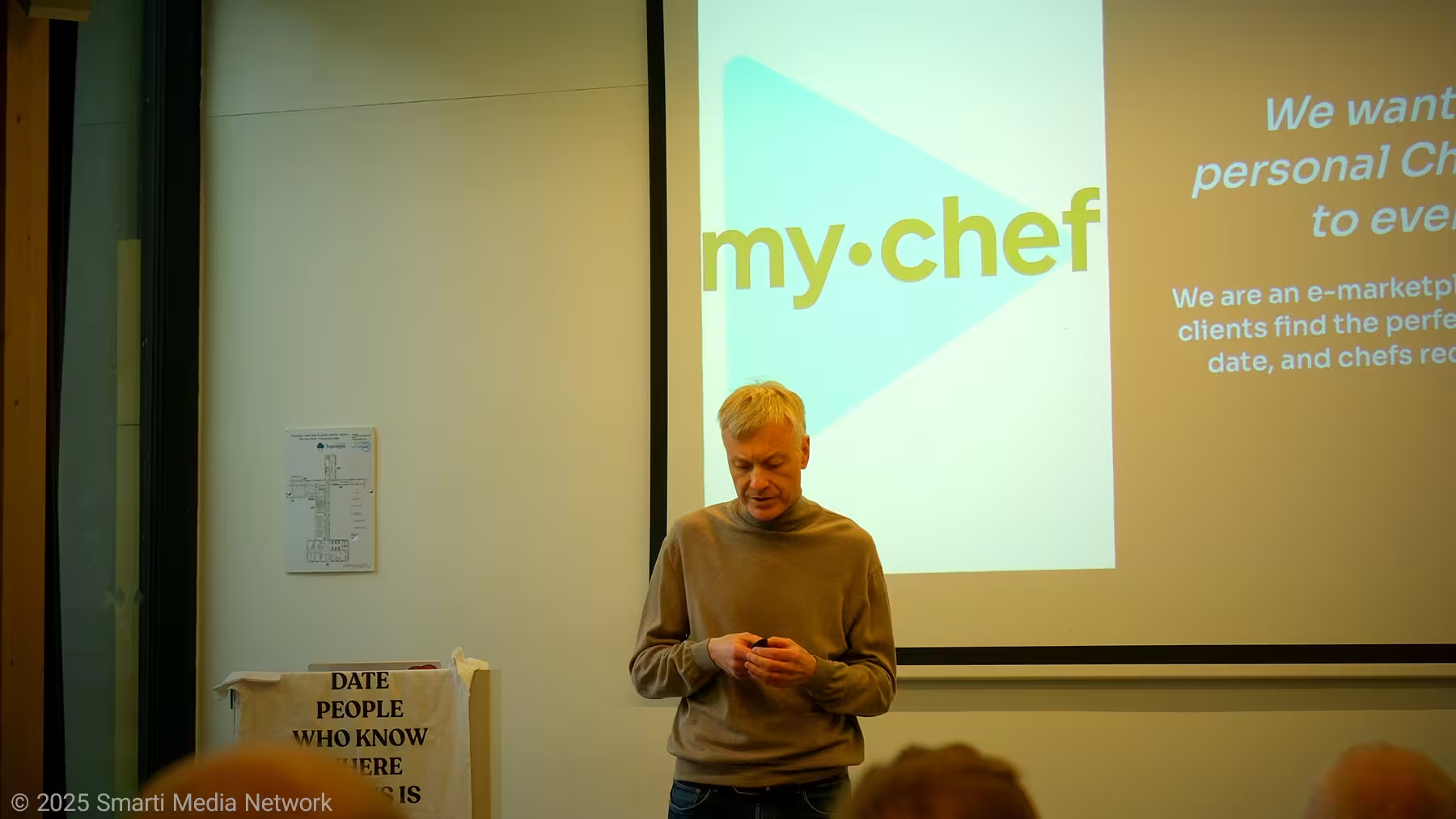
He explained that the traditional options — cooking yourself, or ordering delivery — often fail to meet expectations. Some people lack time, others lack the desire or skill to cook. Delivery services, while convenient, raise concerns about ingredient quality, freshness, and even the working conditions of couriers.
MY.CHEF offers a new solution: a platform that connects households with verified chefs, who come directly to clients’ homes and prepare meals in their own kitchens.
This model guarantees transparency, trust, and quality — customers can see exactly what goes into their food and who prepares it.
The startup envisions a transaction-based model: a fixed fee for matching clients with chefs, plus transparent hourly rates set by the chefs themselves (typically between €15 and €20 per hour).
The app automatically calculates total costs, including commute, cooking, and cleanup time — creating a fair and flexible pricing system.
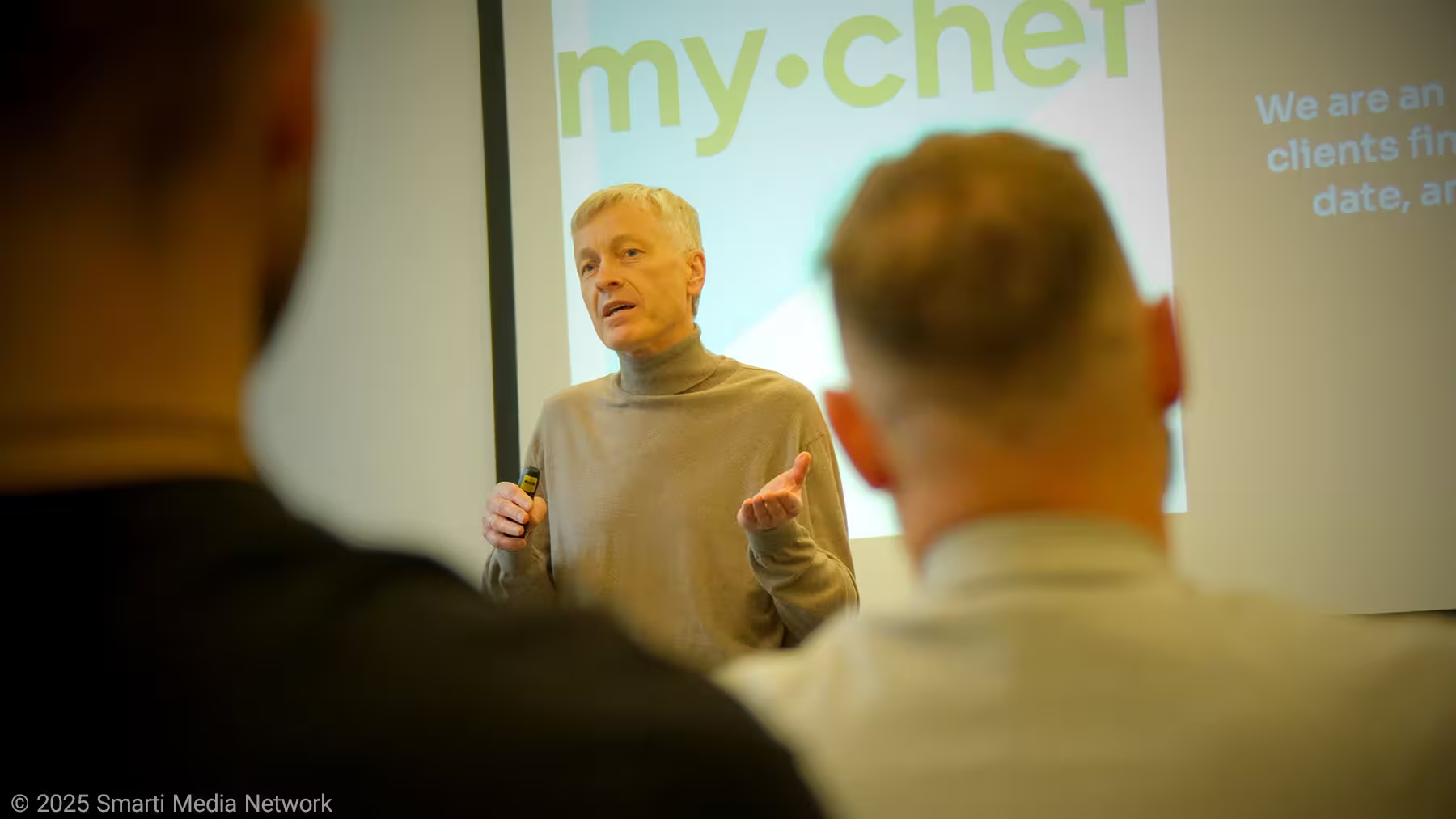
The team, led by the founder alongside co-founder and software engineer Sergio Closet, has already conducted 15 interviews with chefs and 25 with potential clients to validate demand.
Their research shows strong interest — especially from families seeking personalized meals for daily use or special occasions, and chefs eager to earn extra income in a more flexible way.
Currently collaborating with Vilnius city partners, MY.CHEF aims to refine its go-to-market strategy and launch a pilot in the coming months.
With its human-centered approach and transparent model, the startup hopes to redefine home dining — turning kitchens into shared spaces of trust, flavor, and connection.
SensoFarm — Precision Farming, Simplified by AI
The second presentation came from SensoFarm, a startup founded by a farmer with over ten years of experience — someone who openly admitted he didn’t want to be a “traditional” farmer.
“I never wanted to plant corn or barley like everyone else,” he explained. “I wanted to make real money, do meaningful work, and build something sustainable — something that doesn’t harm the land or rely on excessive fertilizers.”
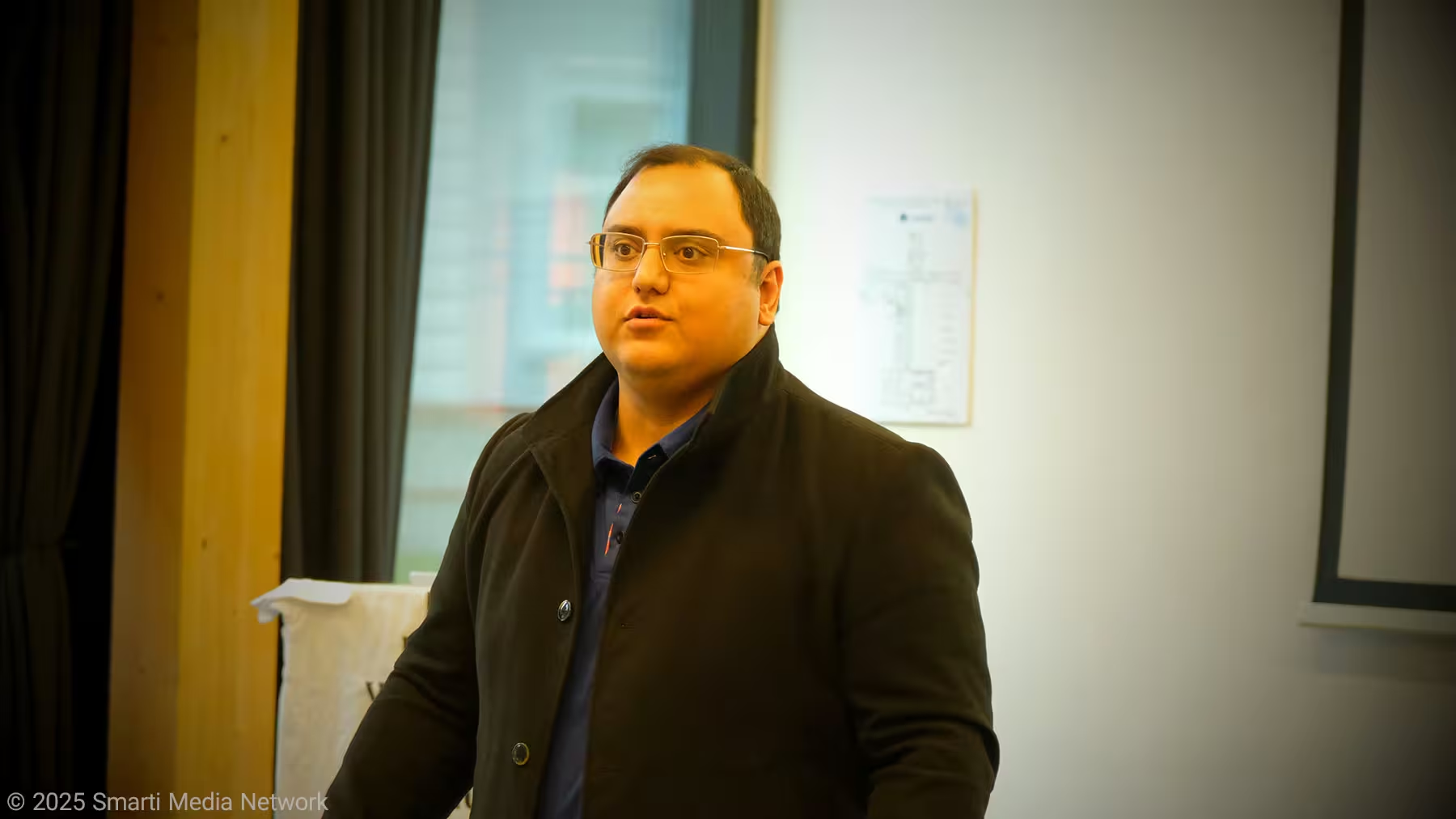
However, he quickly realized that precise, science-based farming requires knowledge that is often inaccessible to ordinary farmers. Even a small variation in yield — 25% more or less — can determine whether a farm is profitable or not. That gap in practical, localized knowledge inspired the creation of SensoFarm.
SensoFarm is a mobile application designed to act as a smart farming assistant. After a user enters their location and selects the crop they want to grow, the app’s AI engine takes over — guiding the farmer through every step:
from soil preparation and seed selection to watering schedules, fertilizer recommendations, pest control, and harvest timing.
It even features an integrated AI chat assistant that provides real-time support. Users can upload photos — for example, showing damaged leaves — and receive precise feedback on what actions to take.
When asked how this differs from generic AI tools like ChatGPT, the founder clarified:
“ChatGPT can make mistakes. SensoFarm is location-aware and crop-specific — everything is based on real agricultural data, local climate, and the exact needs of the plant.”
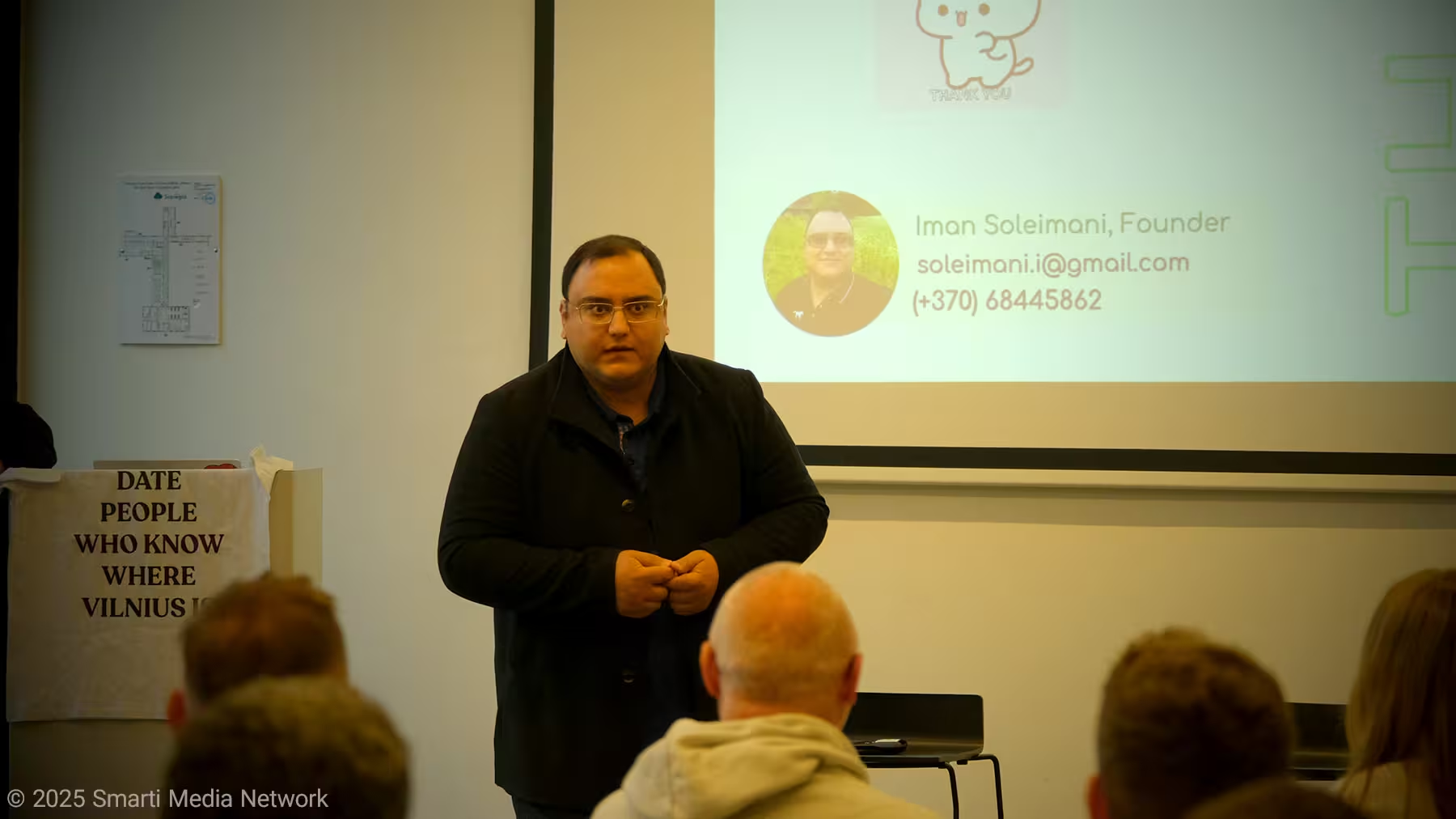
The system is trained on specialized farming datasets, ensuring high precision across thousands of crop types. Whether used for professional farming or small-scale home gardening, SensoFarm aims to deliver actionable, reliable, and context-aware guidance.
On monetization, the startup plans to adopt a B2B revenue model, charging seed suppliers, fertilizer producers, and agricultural service providers for integration and visibility, while keeping the app free for farmers worldwide.
Currently, SensoFarm is available on Google Play, with an initial version live in Vietnam and soon to be accessible in other countries. The founder’s vision is clear — to make advanced, data-driven farming accessible to anyone, anywhere, with nothing more than a smartphone.
AdGen — Automating Ad Creation with AI in Seconds
The third pitch of the evening came from AdGen, a startup aiming to revolutionize how businesses create digital ads. The founder began by describing a common frustration shared by many marketers and entrepreneurs:
“Whenever I need to create ad visuals for Google or Meta, I waste countless hours doing repetitive tasks — just to produce basic advertising images.”
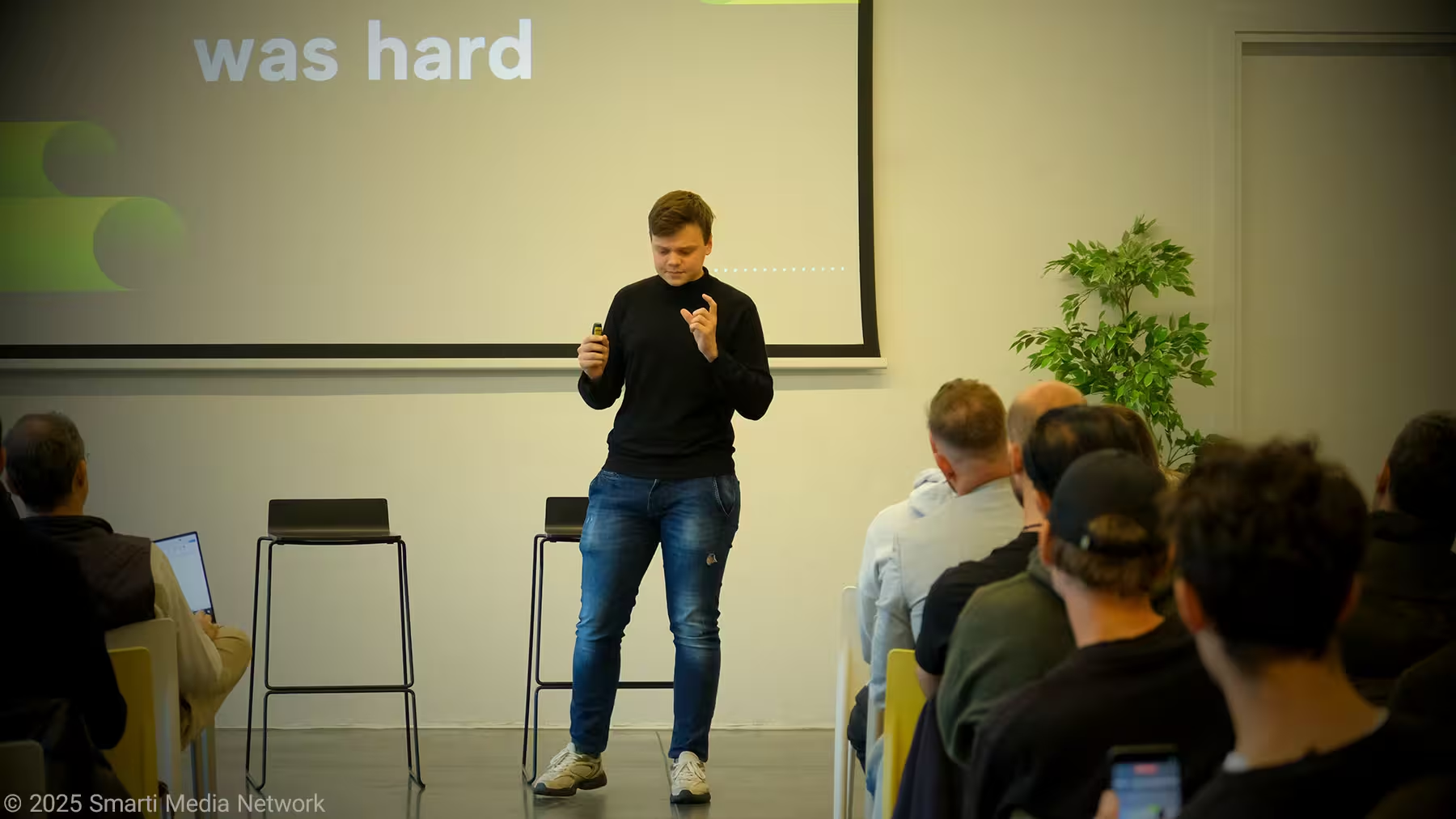
Driven by this inefficiency, he decided to build AdGen, an AI-powered tool that automates the entire ad creation process.
Here’s how it works: the user simply enters a URL — either for their company website or a specific product page — and within less than a minute, AdGen’s AI engine generates complete ad creatives, including images, layouts, and copy.
The system doesn’t stop at automation. Users can customize every aspect of the generated ads through a simple chat interface. They can change the language, adjust design elements, or modify call-to-action buttons just by typing natural language commands — for instance:
“Change the button color from blue to orange.”
The AI then instantly updates the creative to match the user’s request.
According to the founder, AdGen can make the ad creation process up to 85% faster compared to manual methods, saving time and effort for marketers, agencies, and business owners alike.
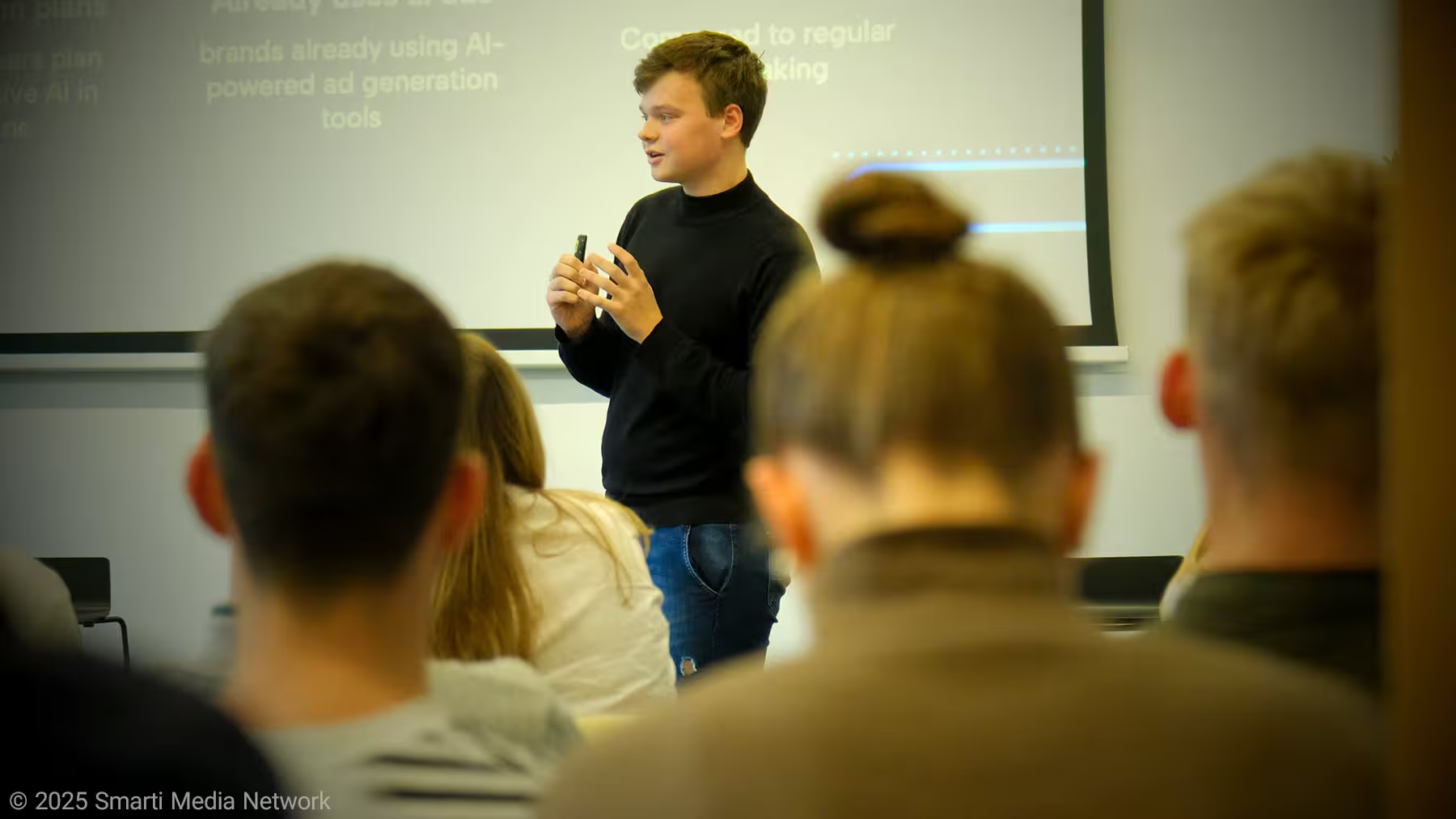
The startup is targeting a rapidly expanding market:
“About 90% of AI-driven companies are planning to integrate AI-generated creative tools by 2030, and more than 6,500 companies already use such technologies,” he explained.
This gives AdGen a strong potential customer base among SMEs, marketing agencies, and tech-driven enterprises looking for smarter ad solutions.
During the demo, the founder showcased how the system could instantly generate a ready-to-use advertisement for a global brand like Adidas, simply by pasting the company’s website URL. The AI produced an ad mockup reflecting the brand’s visual identity, ready for deployment or further refinement.
AdGen’s mission is clear: to simplify and accelerate the ad creation process using conversational AI — making professional-quality marketing assets accessible to anyone, without design skills or long turnaround times.
Talenme — A Global Referral Engine for Scalable Hiring
The fourth startup to take the stage was Talenme, a recruitment-tech company tackling one of the biggest challenges facing modern businesses: finding and attracting top talent.
The founder began by emphasizing a point also raised earlier in the evening — that talent is the number one priority for any company aiming for long-term success. Yet, in Europe alone, companies spend over €30 billion each year trying to attract candidates, while 70% of potential hires remain passive job seekers — people who aren’t actively browsing job boards.
The most effective hiring channel, according to Talenme, is referrals — but the problem is, referral programs are often closed, underutilized, or limited to internal employees.
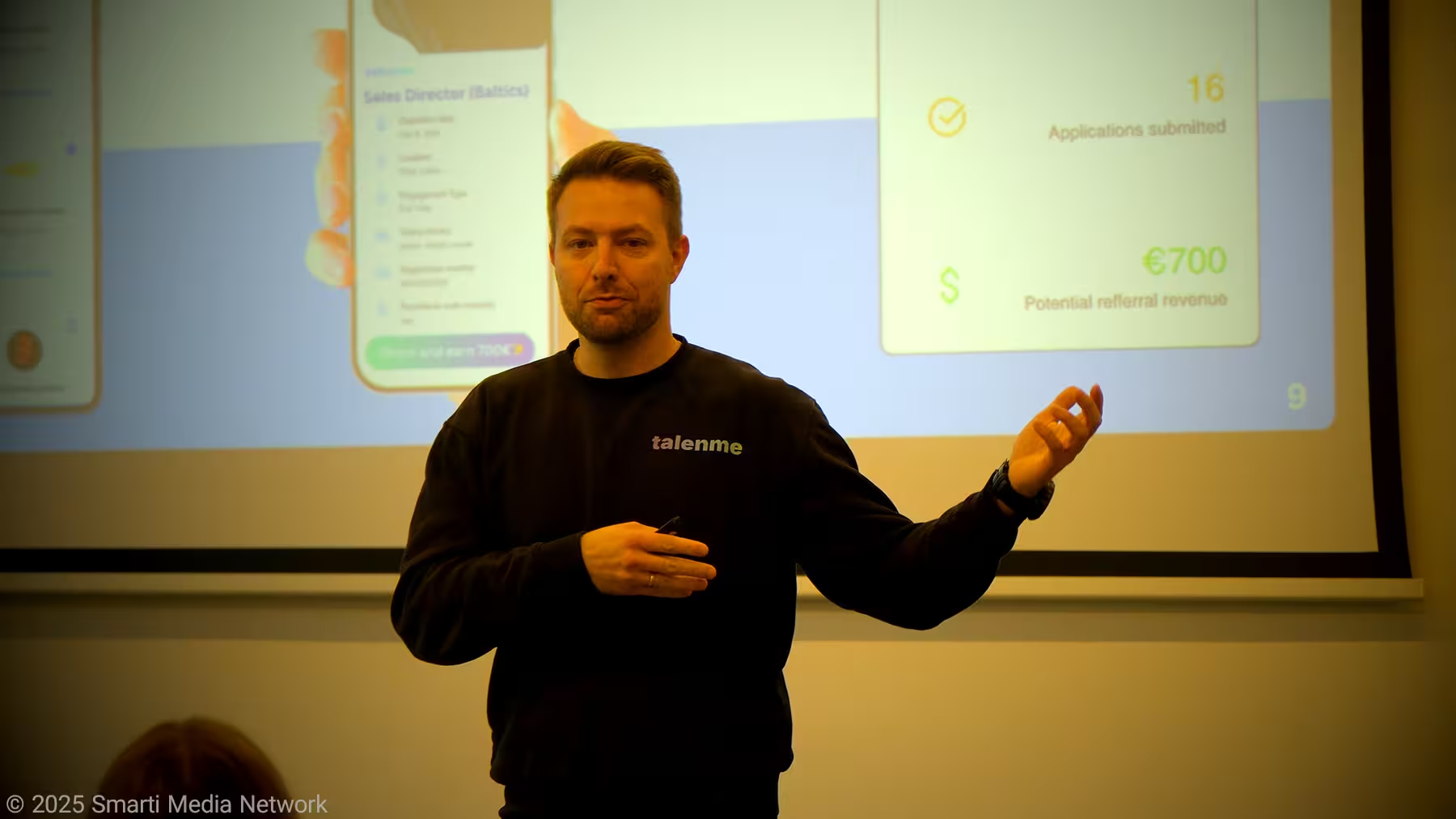
Talenme’s solution is to open up referrals to everyone. Their platform transforms any individual — employees, freelancers, or even friends — into a talent scout, enabling them to share job openings and earn a referral bonus when a candidate is successfully hired.
Here’s how it works:
Companies can create their own public referral pages in just 10 minutes. Anyone can follow a company’s page (for example, Adidas, Nike, or Revolut), browse open roles, and either apply themselves or refer someone they know. If the referred candidate is hired, the referrer receives a cash reward, typically between €500–€1,000 in the Baltics, and up to €3,000 for international positions.
The platform automates everything — from tracking referrals to managing payouts across 150+ countries — ensuring transparency and efficiency. This helps companies reduce recruitment costs, accelerate hiring, and pay only for results.
Since launching in January 2024, Talenme has generated over €21,000 in revenue, growing 40% month-over-month. The team brings deep experience in HR tech and digital product development, supported by a Lithuanian advisor with strong local expertise.
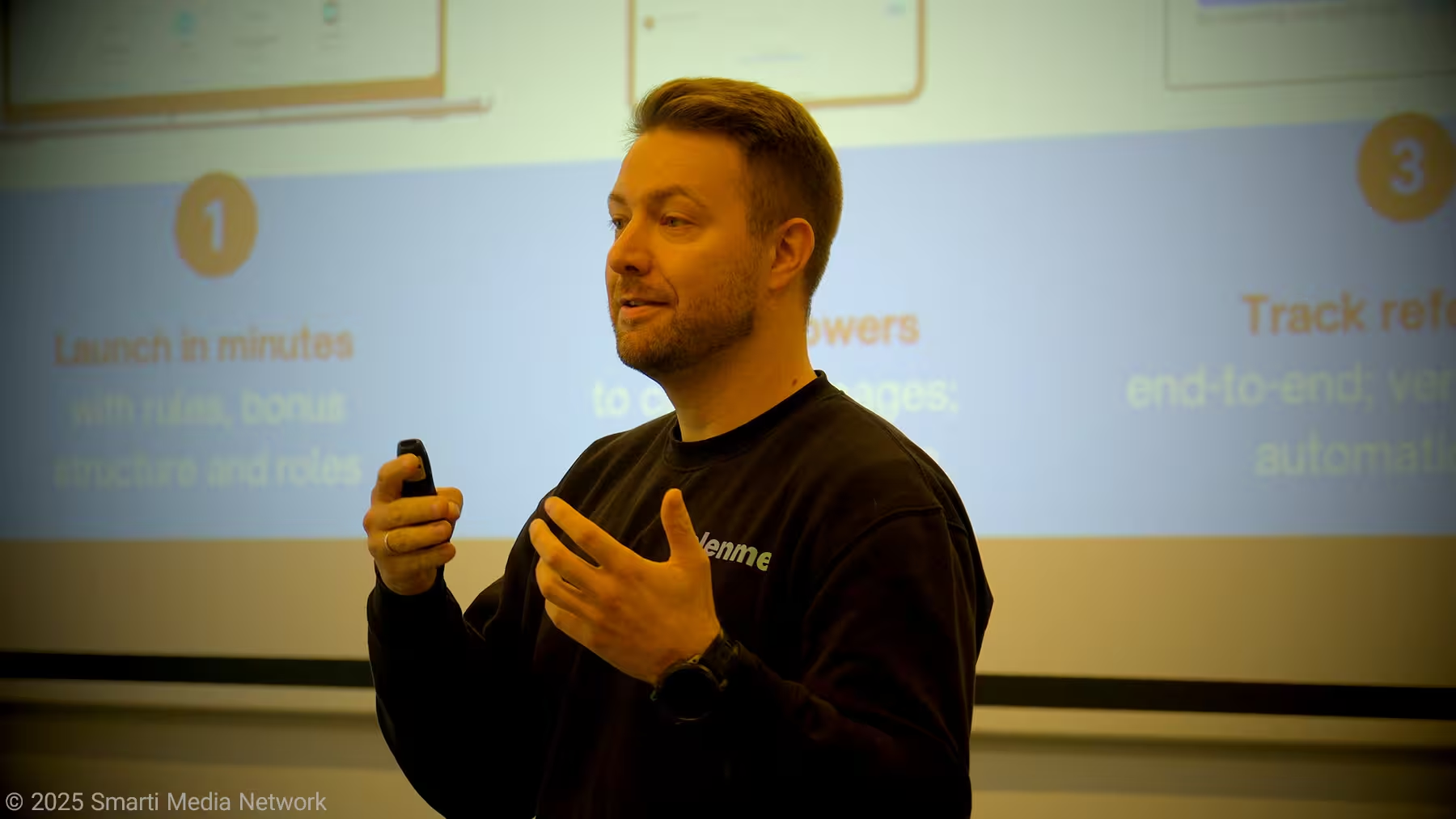
The startup’s business model combines a 90% subscription-based revenue for predictability with a 10% success fee to keep incentives aligned.
Talenme is currently raising €250,000–€350,000 in funding to accelerate product development and global expansion. The founder concluded with a call to action:
“Let’s solve the global talent challenge together — one referral at a time.”
The platform is live at talenme.com, featuring open jobs with referral bonuses totaling over €30,000 — signaling a growing shift toward community-driven recruitment.
NEDx — Nano Education for Micro-Moments of Learning
The final startup to present was NEDx, short for Nano Education, a platform designed to transform how people learn in their everyday lives — by turning short, idle moments into powerful learning opportunities.
Founder Vitali began by describing a universal challenge:
“We all want to learn, grow, and improve — but most of us simply don’t have enough time or focus for traditional education.”
He pointed out that despite companies spending over $370 billion globally each year on learning and development, much of that investment fails to engage employees effectively. Educational programs are often outdated, time-consuming, and poorly adapted to modern lifestyles.
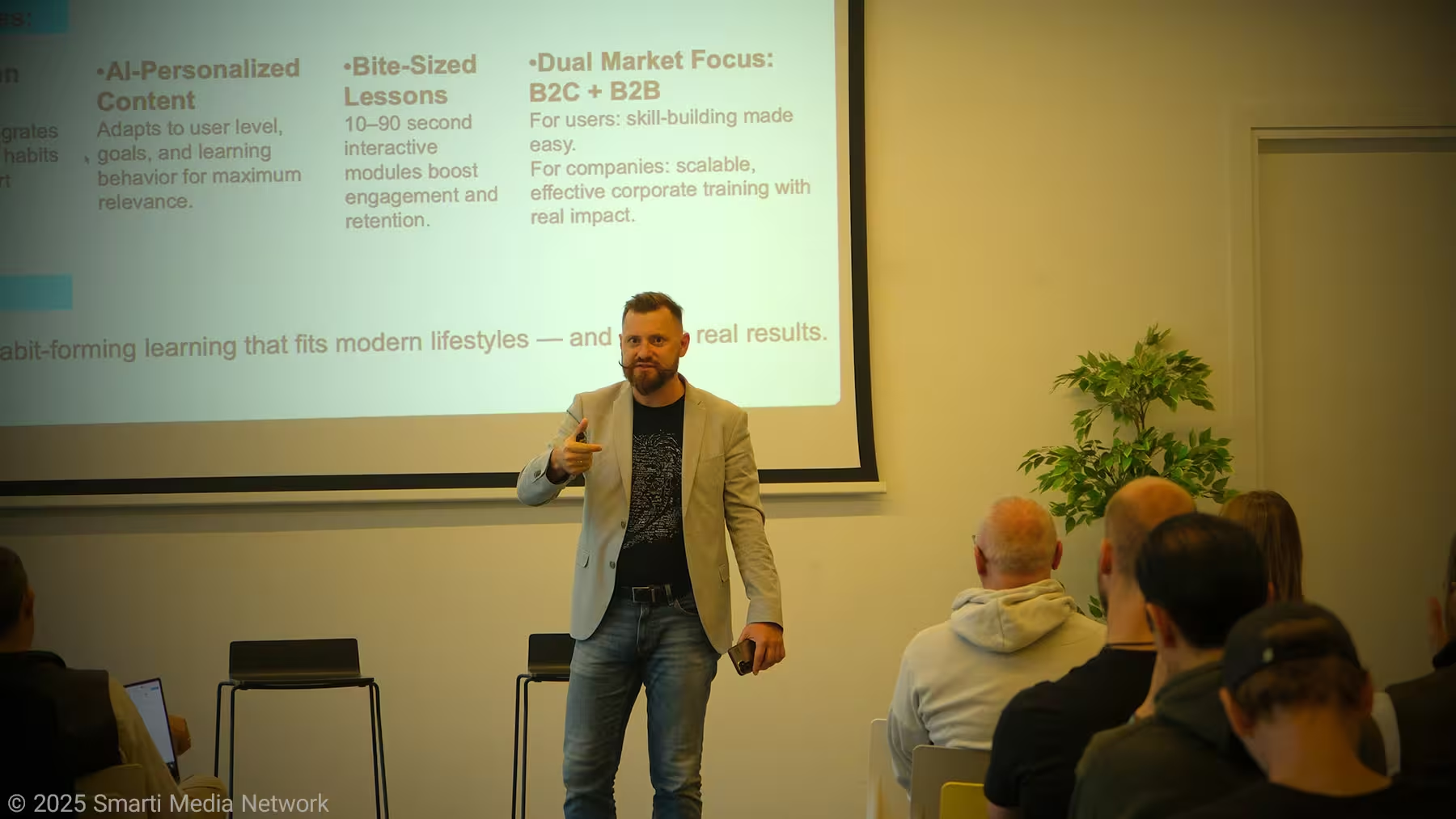
NEDx proposes a different approach — “nano education”: breaking down knowledge into tiny learning units that can be completed in just 10 to 90 seconds. Instead of requiring dedicated study sessions, NEDx leverages micro-moments — like the times users check their phones — and inserts short, interactive learning prompts directly into their routine.
For example, if a user wants to learn English, Lithuanian, or driving theory, they can ask NEDx’s AI assistant to generate personalized nano-lessons. The AI identifies knowledge gaps and tailors questions or micro-tasks accordingly. Each interaction is short, focused, and contextual — gradually building understanding over time.
The platform integrates smart notifications that function more like learning triggers than reminders. As Vitali explained:
“You can’t just dismiss them — to continue using your phone, you need to complete a short task or answer a question. It’s a quick, engaging way to reinforce learning.”
This approach aims to make lifelong learning habitual and effortless, fitting seamlessly into daily life.
NEDx is currently testing its B2C and B2B models, with eight companies already signed up for pilot programs. Early feedback suggests strong potential for use in corporate training, language learning, and personal development.
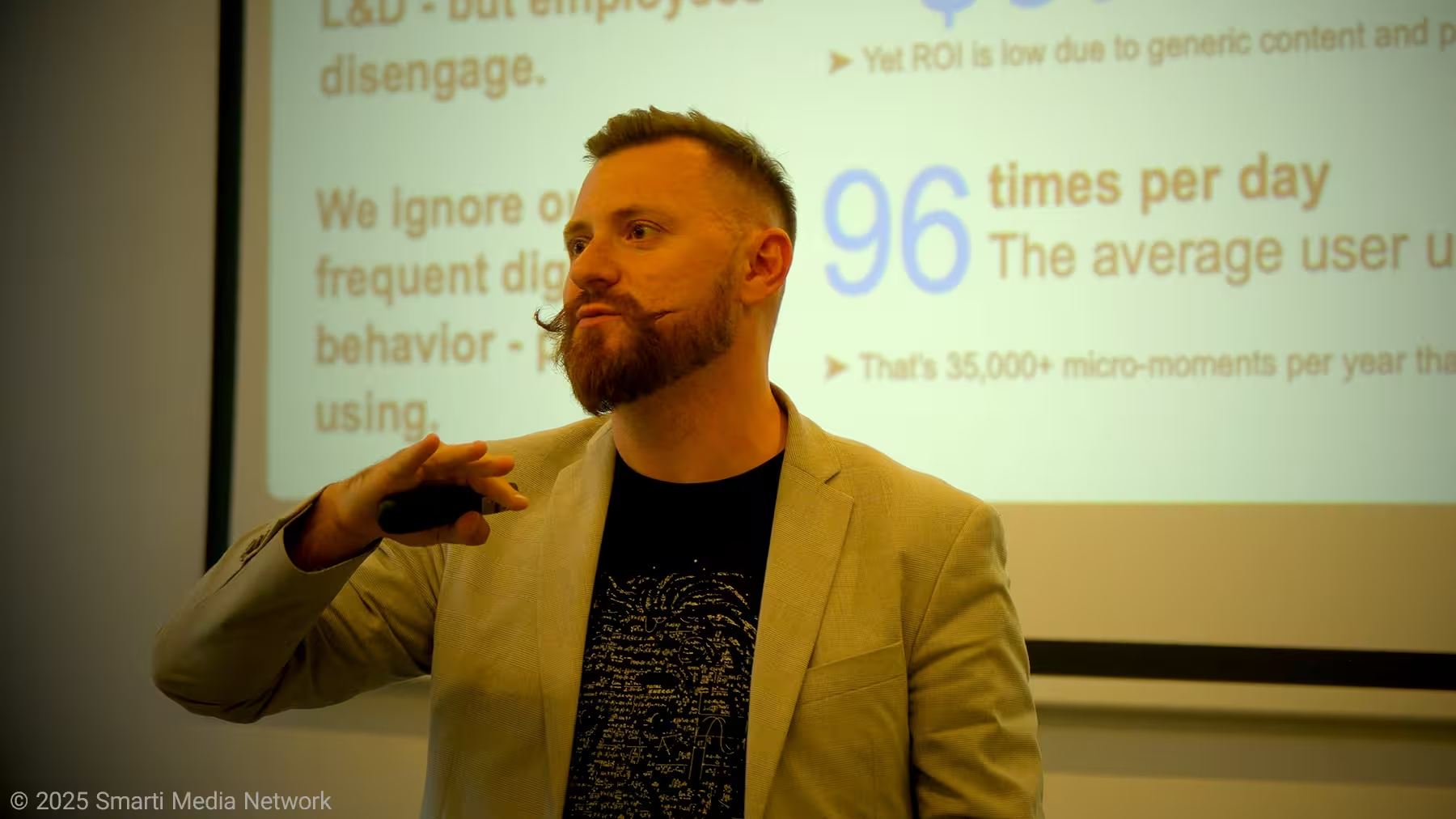
The edtech market targeted by NEDx is growing at over 20% annually, offering a significant opportunity for innovative microlearning solutions. By focusing on personalized, AI-driven, and time-efficient education, NEDx hopes to redefine how people learn — one notification at a time.
Audience Vote & Winner Announcement
After all five startups had pitched their ideas, the audience was invited to participate in a live public voting session to select their favorite project of the evening.
When the results came in, SensoFarm emerged as the clear winner — earning the highest number of votes from attendees.
As a reward, the team received two complimentary tickets to Startup Fair 2025, Lithuania’s flagship startup event taking place on October 9.
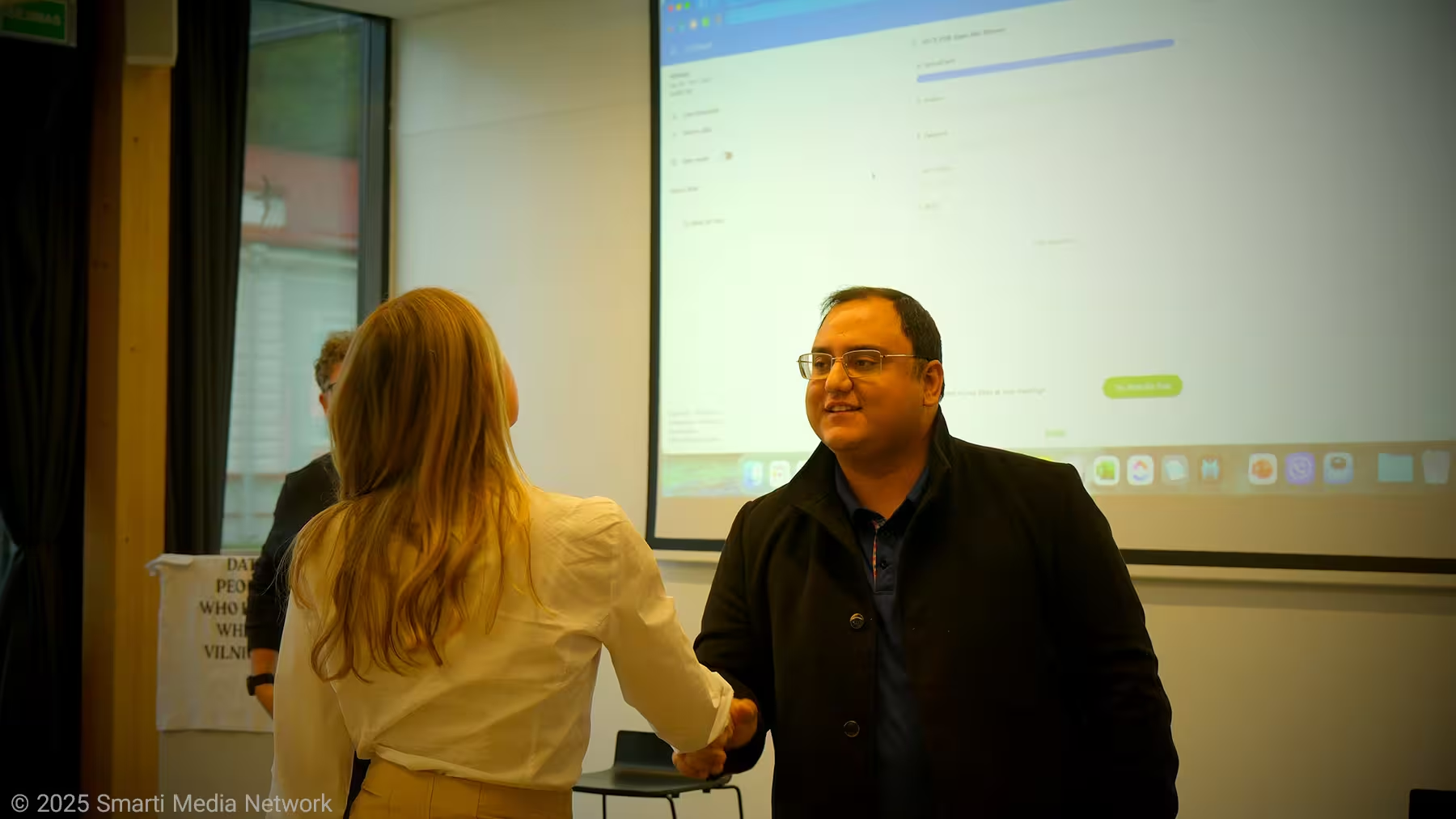
The prize was accepted by Iman Soleimani, the founder of SensoFarm, who expressed gratitude to the community and excitement for the upcoming opportunity to network and showcase the product at a larger scale.
Conclusion
The Startup Meetup Vilnius 2025 in September, once again proved to be a valuable gathering for Lithuania’s growing startup ecosystem — blending inspiration, practical insights, and community-driven energy.
From Andrius Bičeika’s candid reflections on luck, culture, and execution, to Karolina Urbonaitė’s invitation to the Startup Fair, and the diverse pitches spanning food tech, agri-tech, ad automation, recruitment, and edtech — the event showcased the creativity and ambition fueling innovation in Vilnius.
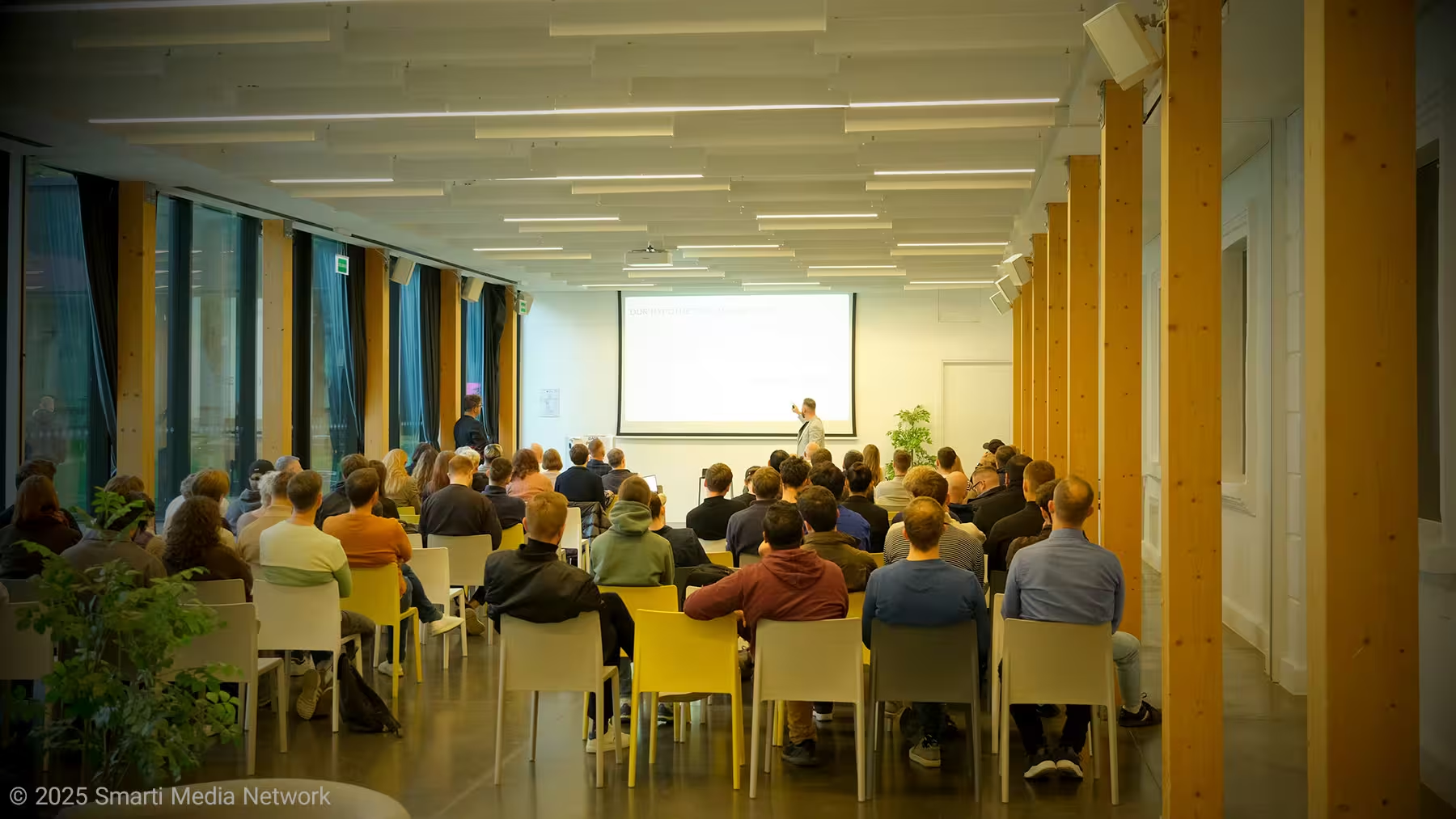
More than just a meetup, the evening highlighted the collaborative spirit of Lithuania’s startup scene — where experienced founders share hard-earned lessons, new teams test bold ideas, and the community comes together to celebrate progress.
As the crowd dispersed into the networking area, one message resonated through the conversations:
Keep building, keep learning, and keep showing up.
Because in a community that thrives on shared effort and action, every spark can become the next big story.
Comments
Marius
Wow NEDx is sneaky brilliant, bite-sized lessons while waiting for coffee? I want this in my pocket rn. MY.CHEF tho, so cozy but hope prices stay fair.
atomwave
Hmm, Revolut's 'luck' angle is honest, but is culture that harsh really sustainable? Sounds like high turnover, elite hiring and burnout. Anyone been inside to confirm?
Paulius.R
Great event, tight pitches. I wish more Q&A time but compact format keeps energy high, nice job.
Nora 13
NEDx could make learning habitual for busy parents like me. I'll try it with language tiny lessonss
Gajo
SensoFarm win is well deserved. Agri-tech with local data is what farmers truly need in my view
Av
I think they were cheating! this voting system always have problem
See me!
MY.CHEF is my soulmate idea. If chefs are verified and prices ok, sign me up as a regular client
Rūta NG
Startup Fair sounds huge — I'm buying tickets. Hope to meet founders and maybe mentor a team
L55
Great energy at Vilnius meetup! SensoFarm pitch win a little suspicious but i think they should use better speech, that guy was there really looks like drunk :))
Emily
I loved Andrius' honesty — luck and execution ring true. Inspired to just ship more, even if imperfect.

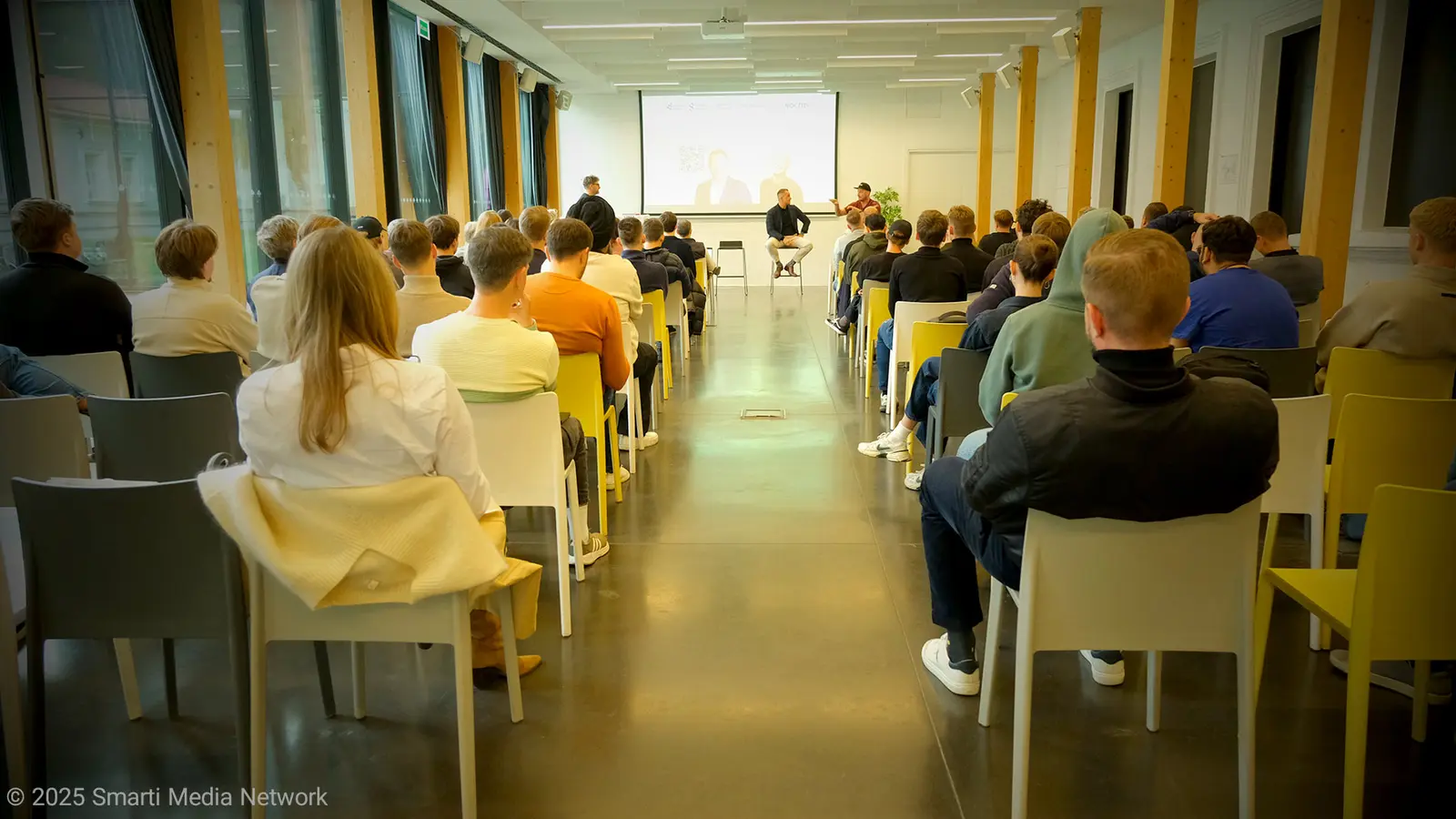
Leave a Comment